The importance of being an artist was on my mind when my oldest son was studying 3D animation, and computer modeling.
My son is a talented artist with a degree in Fine Arts and Graphic Design, but like many young artists he has a passion for fine art as well as technology.
This got me pondering being an artist, and the possible irrelevance of Art in a modern world which is computer driven. On a number of occasions, I have heard people ask, are we as artists a dying breed? Will fine artists go the way of the dinosaur?
Personally, I think NOT!
Artists truly are the movers and shakers of the world. The ages demonstrate that artists have been at the forefront of every epic era. Oscar Wilde’s famous quote, “Life imitates art far more than art imitates life”, illustrates this.
Art has been said to be ‘an expression of both hope and despair’, which embodies all facets of the human condition. The awe inspiring cathedrals of Europe rose from the ashes of plague, cruelty and despair. After which, the forward thinking artists of the Renaissance era emerged in times of religious persecution and political chaos…
I believe, the worse things get – the more indispensable Art becomes. As our American economy sags and democracy weakens amid the smothering of our beloved earth, Art will find fertile ground and bloom.
Art in all its forms, is the universal language. It is the great equalizer and thinking agent. Art reaches across borders and connects the world. Great Art stirs the imagination, causing us to pause, think and reflect. Art allows our minds to escape into childlike wonder. Paintings are windows to the imagination.
Did you know, the act of drawing and creating Art can help us relieve stress? Also, Art improves students in their personal, intellectual, and social development. It can be especially beneficial for children from economically disadvantaged conditions or those who struggle to succeed in school.
Art records the footprint of all peoples, cultures and the world around us:
From prehistoric times, cave dwellers drew and carved on rock walls to record important history.
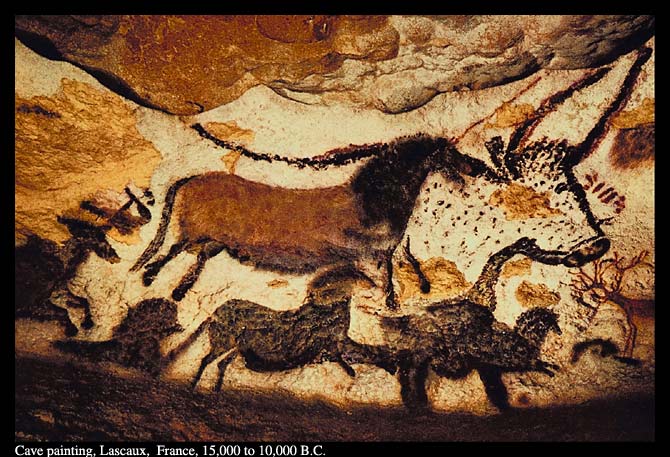 Inspired by biblical times, artists recorded the life and death of Jesus. The Mesopotamians, Egyptians, Greek and Roman artists left us invaluable traces of their culture and our human heritage through their art.
Inspired by biblical times, artists recorded the life and death of Jesus. The Mesopotamians, Egyptians, Greek and Roman artists left us invaluable traces of their culture and our human heritage through their art.
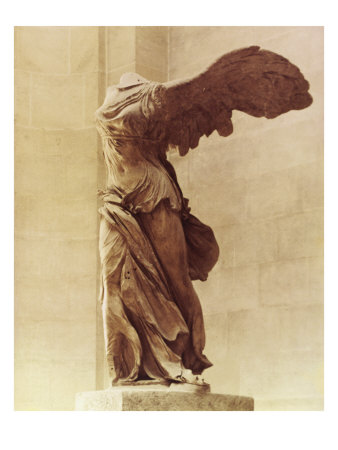 Still life paintings often adorn the interior of ancient Egyptian tombs and Roman walls and record information about the vessels and delicacies that the upper class might have enjoyed.
Still life paintings often adorn the interior of ancient Egyptian tombs and Roman walls and record information about the vessels and delicacies that the upper class might have enjoyed.
Lavish tapestries, book-covers in precious metal, ivory, jewels and mosaics help us understand the Dark Ages.
The Renaissance era was lead by visionary artists, such as Leonardo da Vinci, Botticelli, Raphael and Michael Angelo.
John James Audubon (April 26, 1785 – January 27, 1851) painted, catalogued, and described the many birds of North America. (Although, he killed too many while he was at it).

The Impressionists were considered the ‘radicals’ of their time and broke the rules of academic painting.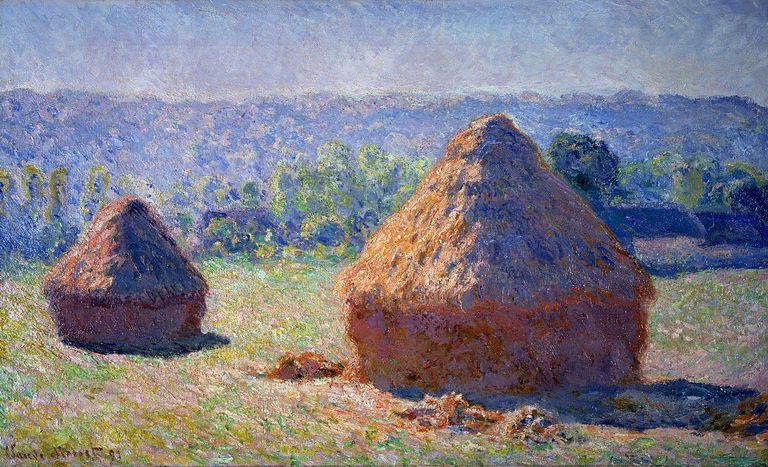 Sure, now we have the modern capabilities to record history with a camera. And yes, I loved the movie Avatar. In fact, it gave me a whole new appreciation for the artists in that industry.
Sure, now we have the modern capabilities to record history with a camera. And yes, I loved the movie Avatar. In fact, it gave me a whole new appreciation for the artists in that industry.
However, nothing will replace the feeling of being in the presence of great Art – whether you are at the Louvre Museum or staring at a beloved painting in your living-room. The silent story of the brushstrokes made by a master’s hand or a vessel formed by a primitive artisan will never be obsolete.
Upon graduation, my son worked for Disney in the exciting field of 3D animation where he made computer games and feature films.
What do you think about being and artist in day and age of computers? I’d love to hear from you!
~Lori
You might like to read:
Why Paint Abstract Art? or
Finding Great Art Instructions – 7 Tips to Help You
Feeling Blue in the Studio?
How to Choose the Right Paint Brush for the Art Technique
Tips for Painting Water and Reflections
The Best of 2010: Articles on Art, Marketing & Social Media
I found this essay interesting:
The Relevance of Art in Times of Crisis


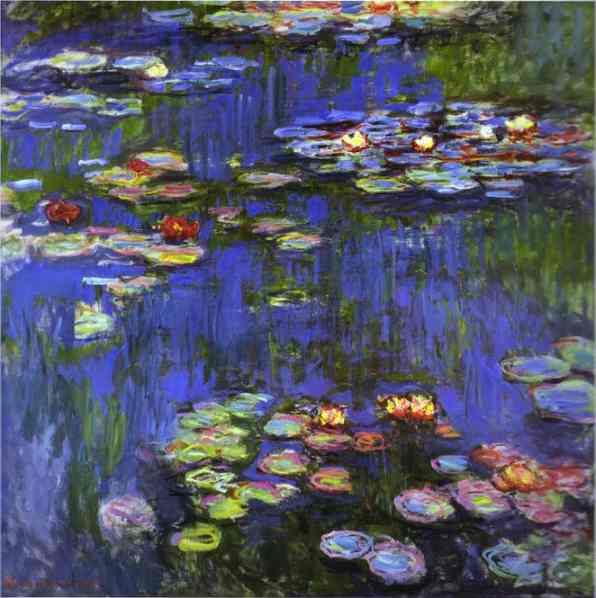

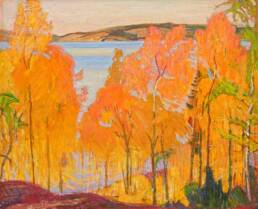
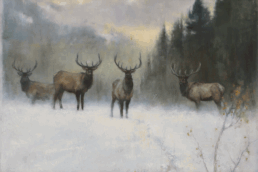
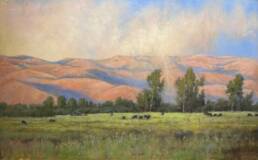
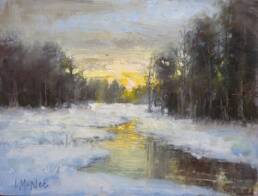
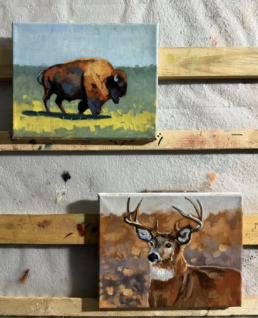
more than words
Nicely said – one of the things about digital arts is that they are not readily accessible without a ‘reader’ and need to be translated in order for humans to interact with them. If your hard copy art can survive the elements, as long as people have eyes and a sense of touch, your creation can speak to people throughout time no matter what the technology of the day is.
Hi Austin. How true that is. Thanks for reminding us of the very important difference between the two art forms. Most people are tactile and fine art is tangible. I really appreciate your great comment. It enriched the post.
Cheers-
Lori
No but you’re wrong here. You can create a print that will survive as well as an oil painting. People need to rid themselves of this ridiculous traditional notion that art has to be made completely with your hands. This isn’t 1800 anymore. Heck, this isn’t 1980 anymore.
I’d be interested in learning more about a print that will survive hundreds of years. Personally, I truly appreciate digital art in all its forms. However, art made completely with our hands is not a ridiculous notion, nor will it be obsolete.
Thanks for reading this post and for your input! ~Lori
Yes, I agree. I’ve been a traditional, fine artist all my long life and I recently got interested in digital art. I’ve been researching tablets, art programs and looking at as much digital fine art as I could find. Sadly, I’m disappointed. I haven’t seen that soul and depth that inhabits a quality piece of fine art.
There may be some artists who can actually create a great piece of fine art digitally but I feel that, for all the trouble one goes through to learn the complicated programs, why not just use paint and brushes? However, there is the savings on paint, paper and canvases to consider.
Having said all that, I’m still pursuing my research and I plan to use digital art for my children’s book illustrations, mainly because it’s been fun so far, even though I’m still steeped in ignorance. And I love the idea of being able to erase anything and not have to redo some, as I often do.
Thanks.
Hello Lucille, that is quite interesting. My son loves his digital art, but I notice his energy gets zapped by the computer. He is always sitting, staring at a screen, and I don’t think that is healthy. I encourage him to get outside! I feel that traditional artists find more inspiration from nature!
Good luck with your digital children’s illustrations.
I completely agree that art will endure, no matter what technological innovations we make! Like Austin said we as humans will always be enthralled with something more tactile! That’s waht human nature is! They having talking about end of art for almost a century now but we still thrive! The human race has gone through turmoil through the ages but our ablity to love and create art has stayed the same…..
Ishita
Well said, Ishita. Thank you for sharing your thoughts on this post. Art really stirs the emotions. Thanks for sharing yours!
Lori 🙂
I find it sad ..when invited to people
houses
and they have low grade prints and faded photos
on there walls
I wish more people would realize how wonder it is
to have least one professional hand painted picture in there
home
Nick, I totally agree with you. A home without art is like a wall without windows!
Thank you for your thoughts-
Lori
This post reminds me of a conversation I had with a guy who, after I told him I was a watercolor painter, informed me that he was an artist too but he had never picked up a paintbrush or pencil. He mostly played around with Photoshop. While I don’t dismiss digital art, there is something to be said about the process of grasping the brush, applying those strokes, sketching those lines and conveying that sensual experience to your audience.
Every time someone writes me and tells me they feel invigorated by looking at the colors in my work, or how one of my pieces lifted their spirits, I’m reminded of the importance of art an am grateful that I am able to contribute something positive and creative in this world.
You are so right. I love how you made a retrospective list pointing out that artists really led others into new eras and left new aesthetics standards.
Hello Slavko,
I enjoyed contemplating and writing this post. There is value in being and artist…and I can’t imagine the world without art. Glad you stopped by for a visit and comment.
Lori 🙂
Renaissance paintings document the history of the times. Fine art was a way of expressing beauty, recording events, and documenting history. Why should today be different just because the technology is different?
Great addition, and of course, I agree with you. Thanks for sharing.
Lori
Dear Lori:
Thank you for this meaningful and thought-provoking article. Many years ago in university the academics frequently echoed the sentiment that painting was dead. But now? Watch the results of auction houses and what continues to be in vogue for fund raising! Yes painting’s posture continues to heighten and serve the public good.
I certainly hope your son is enjoying studies in BC. Lots of inspiration, but big shoes to fill in terms of Canadian art history.
Regards,
Bruce
Yes yes yes….. We need our children to create art not remove it from their education. Keep on Creating Lori. 😀
Hi Melissa, thanks for your input here. I couldn’t agree with you more. Art was such an important part of my lower school education. I could relax, and feel free in there.
Thank you for stopping by,
Lori
in all forms art is an universal language.i agree with this. art can communicate all our stresses, happiness and all our feeklings. it is the reflection of our culture, lifestyle etc
Yes! Beautifully put…
Lori 🙂
This may be a odd quesion, but what is considerd Art?, real art?
That is a BIG question! Here are a few quotes to ponder…
Art is a discovery and development of elementary principles of nature into beautiful forms suitable for human use.~Frank Lloyd Wright
Art is not a thing — it is a way.~Elbert Hubbard
Art, like paper books and natural media…will never disappear. From an engineer.
Thx
Thank you for adding your thoughts. I agree, obviously. 🙂
Well said! Love the fact that we share the same opinion.
Most of us on this site do! We must band together…lol. 🙂
life without art or artists? no way. It’s the breath of the soul, the colour of dreams, the essence of Love
Hello Pio, what a nice surprise finding you here on my site. Thank you for your continued support of me and the Arts!
Our educational system for the most part has us heading in directions that support the Industrial Complex. Engineers, Doctors, Lawyers, Managers, Accountants, etc. Yet many of these same people at a young age could well have turned out to be fantastic artists. I think it would be more balanced to allow kids to show you if they are artistic or not and then acknowledge it .. and guide it with opportunities for work .. as you stated regarding your son.
We live in an interesting time! People like Michelangelo and Da Vinci .. do awesome work but sometimes leave us with little insight into the background. A Painting or a Sculpture .. are certainly capable of standing the test of time .. even if it has to be cleaned/restored. What would the great artists of centuries past been able to do with our tools .. what kind of masterpieces would they be able to produce? Take the “Madonna” .. what if the artist had been able to leave a story about that piece? What if we could hear these artists speak to us with sound? What if they could produce a digital animated movie with a great message?
To be an artist is not about being able to pain in some organized manner on a canvas .. or knock the excess from a sculpture .. an artist is someone who applies art in all areas .. whether it is preparing food for taste and eye appeal .. or the patience of a surgeon’s knife! An artist is someone who can spin a tale with or without poetic words .. or use real media to create a beautiful landscape .. rocks, grass, ponds, flowers, timbers, trees, fish, etc. An artist can take metal and create something very useful that did not exist before. An Artist is a Magician!
I enjoyed your blog post. All the best to your son!
~Merwin.
Wish there was a way to edit a post! :/ Oh well! 🙂
I wrote this when I was a new blogger…I will clean it up. Thanks for reading anyway. 🙂
Thank you Merwin for your thoughtful comment. I totally agree with you about our educational system and the fact that many professionals could have been artists had they been exposed. I believe that all people are born with artistic talent, but if we don’t use it, we lose it.
Artists are magicians! I love that thought. We can move mountains too (in our paintings) 😉
I’m glad you enjoyed this post. Your insights are poetic and artistic!